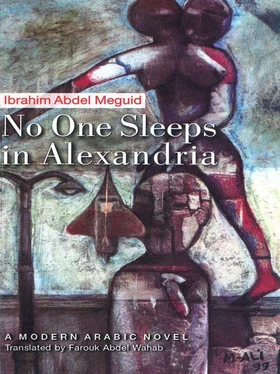“It seems to be a box of cookies,” he told Dimyan.
Dimyan fell silent for a moment as Magd al-Din opened the box and found it indeed filled with cookies.
“You know what I really crave, Sheikh Magd?” Dimyan said.
“No.”
“A can of Australian corned beef.”

The workers doubled up with laughter at Dimyan’s fear of getting too close to the African soldier. They were drinking their afternoon tea after coming back to work at two o’clock. There was nothing important to do that afternoon. The foreman, Usta Ghibriyal, never joined in their laughter, content with a smile. This supervisor was Dimitri’s relative who had told him of the job opportunities in the railroad. He was of a diminutive build, with a graceful and gentle demeanor, and always kept to himself in a far corner looking at a small notebook that he had with him at all times. He could always be seen scribbling away in that notebook with an indelible pencil, adjusting his beret that he never took off, even while seated, pulling it closer to his eyes or pushing it back a little. When not writing with the pencil, he always placed it, with its shiny metal holder, in the upper pocket of his green jacket, in such a way that it poked from the edge of the pocket, a constant reminder that the pencil was always ready, at a moment’s notice, to write. The workers knew that he took down notes on the progress of the day’s work, prior to copying them in an official report to the administration at the end of each week, yet they never ceased to be surprised at the way he wrote, imagining, perhaps, that it was some form of magic, especially since he took such pains with his penmanship. Hamza commented on that once by saying that Usta Ghibriyal loved to write in that minuscule script of his, that at night when he did not have anything to do, he would erase what he had written during the day. That, he added, was confirmed by the fact that he always used the same notebook.
Today their co-worker Hamza laughed the most at Dimyan’s fear, but he did not double over because he was too short. Hamza walked in a strange way, with his legs bowed. And even though he was not yet forty, he looked older. He had a ruddy complexion and blue eyes, like so many people from Rosetta. He was so excessively polite that it made people uncomfortable. He always greeted everyone he met, and if it happened that he left the post and returned in a short while, he would greet his colleagues as if he had not been with them only a few minutes earlier. He was also constantly apologizing for any mistake, no matter how trivial, such as standing up before someone else did. At the beginning, Hamza’s demeanor surprised Magd al-Din and Dimyan, but little by little they grew used to it. Magd al-Din concluded that he was a good man, whereas Dimyan thought that he was almost an idiot. Hamza had a bad habit, though, that caused his colleagues to make fun of him; no sooner would someone say something or tell a story than Hamza would say that the very same thing, in exactly the same manner and at the same time, had happened to him. This became such a well-known trait that some of them made up stories so that Hamza would retell them as things that had actually happened to him, whereupon they would burst out laughing, declaring that they had made up the story. But he would counter by saying that his was a true story, and he would laugh with them, proud and triumphant. Thus he was the hero of all stories, both fantastical and true. If a killer in southern Egypt escaped and hid in a corn field, forcing the police to burn down the whole field to capture him, that same thing happened to him, but in the Daqahliya province, not southern Egypt. As for the man who went out at night to relieve himself on the bank of the Mahmudiya canal and was pulled down by his ass into the water by a female jinn, never to come out again, Hamza had seen someone pulled into the water in the same way. The man cried for help, but Hamza stood there, nailed in place, unable to move at all to rescue him; he could only move after the man had settled down at the bottom of the canal. As for the white donkey that more than one person had seen in their villages at night and that then disappeared as they approached it, Hamza had met innumerable white donkeys and ridden them all.
The strangest story was the one about the man who went at dawn to the Mahmudiya canal to perform his ablutions there. When he was done and as he stood up, pulled his pants up, and started walking, he felt something moving between his legs and under his buttocks, something giving him a little squeeze. The man pulled up his gallabiya and undid his waistband to see what was here, and found a number of white baby rabbits, dozens of them that looked like little mice playing in his underpants. The man ran home but could not stand still afterwards because of the strange movements of those rabbits. Then he could not sleep; what would he do about those rabbits that had taken up residence in his pants? He had to go down to the street again, and stopped screaming only when he noticed that everything around him was silent. He was so unable to get a grip on himself that finally he fainted and people saw dozens of rabbits running out from between his legs, white rabbits running every which way. The man died of fright. Hamza wore the most solemn oath that that had happened in his village also. Dimyan bent toward Magd al-Din one day and said to him, ‘This Hamza, for sure, is an inveterate liar.”
“Why should that bother you? Leave creation to the Creator, Dimyan.”
Dimyan could not stay quiet. “Nothing annoys me more than four forbearance and patience, Sheikh Magd!”
“You cannot change him,” Magd al-Din said with a smile. ‘He’s used to it, and the men have gotten used to him.”
Today, as Hamza was laughing at Dimyan’s fear, his face looked very red because he had just finished making tea on the wood-burning stove. He almost choked while laughing; blood gathered in his face as a result of the laughing, the fire, and the choking, and he almost ignited. When he was able to speak again, Hamza said, “Me too, the first time I saw an African, I was afraid of his tail. He was handing me a can of choice Australian corned beef, but I was afraid. I moved away and told him to throw it to me, but he didn’t respond, so I said to him in English, “Throw it!” and he did. The strangest thing was, he understood the English and not the Arabic!”
Dimyan looked at him, barely concealing his annoyance, and asked, “Did you see his tail, Hamza?”
“Yes, I did, but I was afraid to grab it, yes, sir.”
The workers burst out laughing and Dimyan remarked, “Maybe you were afraid, when you grabbed it, it would turn out to be something else!”
At that point the laughter was hysterical, and Hamza joined in, once again choking, which only annoyed Dimyan all the more.
Usta Ghibriyal smiled faintly and continued his magical scribbling.
Hamza asked Magd al-Din, “What do you think, Sheikh Magd — is it true that Africans were originally monkeys?”
Magd al-Din thought a little, and the workers waited for him to answer.
“Only God knows,” he finally said. “What I heard was, the monkey was originally a man who wiped his ass with a loaf of bread, so God changed him into a monkey. That’s what we heard as children. But I don’t believe it, because God has ennobled man, so God would not change him into a monkey. Also, it could not be that man was originally a monkey.”
The workers looked relieved, and so did Usta Ghibriyal, who said, “You speak wisely, Sheikh Magd, What do you think, Hamza? Did you see a man turn into a monkey?”
The workers laughed uproariously because this time the speaker was the usually silent Usta Ghibriyal.
Читать дальше













